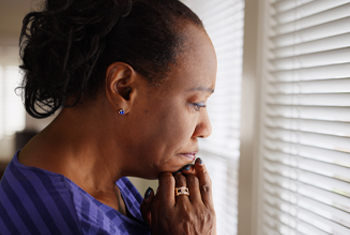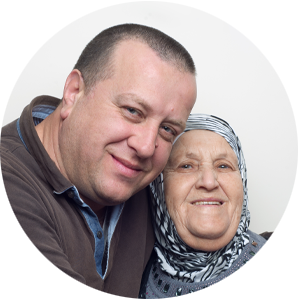What you need to know about getting glaucoma treatment in Brooklyn and Manhattan
Are you suffering from glaucoma?
These challenges may sound familiar…


You have glaucoma
Increased pressure in your eye is damaging your optic nerve. If left untreated, it is likely to steal your sight completely.
Do you feel afraid?
Just the word glaucoma triggers feelings of fear, anxiety and uncertainty. Not knowing the fate of your vision can be depressing.
Time might be running out
Loss of peripheral vision, seeing halos around lights, and discomfort are just a few of the debilitating side effects that can destroy your day.
Save your sight
We understand how you feel. With our range of modern treatment options we can control your glaucoma and prevent further damage to your precious eyes so that you can enjoy life again.
Glaucoma explained
In these toggles we explain what you need to know about glaucoma
Glaucoma is a disease that damages your eye’s optic nerve.
It is a leading cause of blindness for people over 60 years old. However, blindness from glaucoma can often be prevented with early treatment.
Glaucoma occurs when fluid builds up in the front part of your eye. The extra fluid increases the pressure in your eye, damaging the optic nerve.
Your eye constantly makes aqueous humor. As new aqueous flows into your eye, the same amount should drain out. The fluid drains out through an area called the drainage angle. This process keeps pressure in the eye (called intraocular pressure or IOP) stable. But if the drainage angle is not working properly, fluid builds up. The pressure inside the eye rises, damaging the optic nerve.
The optic nerve is made of more than a million tiny nerve fibers. It is like an electric cable made up of many small wires. As these nerve fibers die, you will develop blind spots in your vision. You may not notice these blind spots until most of your optic nerve fibers have died. If all of the fibers die, you will become blind.
The only way to diagnose glaucoma is with a complete eye exam.
During a glaucoma exam, we will:
- Measure your eye pressure
- Inspect your eye’s drainage angle
- Examine your optic nerve for damage
- Test your peripheral (side) vision
- Take a picture or computer measurement of your optic nerve
- Measure the thickness of your cornea
Glaucoma damage is permanent – it cannot be reversed. But medicine and surgery help to stop further damage.
Open-angle glaucoma
To treat open-angle glaucoma, we may use one or more of the following treatments:
Eyedrops
Glaucoma is usually controlled with eye drop medicine. The eye drops lower eye pressure by reducing the amount of aqueous fluid the eye makes. Others reduce pressure by helping fluid flow better through the drainage angle.
Eyedrop medications include:
- Prostaglandins
- Beta blockers
- Alpha-adrenergic agonists
- Carbonic anhydrase inhibitors
- Rho kinase inhibitor
- Miotic or cholinergic agents
Oral medications
If eyedrops alone don’t bring your eye pressure down to the desired level, we may also prescribe an oral medication.
Laser surgery and other therapies
There are two main types of laser surgery to help aqueous drain from the eye and stop the progression of glaucoma.
- Laser trabeculoplasty
- Filtering surgery
- Drainage tubes
- Minimally invasive glaucoma surgery
Angle-closure glaucoma
Acute angle-closure glaucoma requires urgent treatment to reduce the pressure in your eye. This typically requires both medication and laser or a surgical procedure such as iridotomy.
Discover your options to get your eyes back in top shape
Call us and we’ll help you take the steps you need to repair your eyes
How to get help
These 3 easy steps allow you to stop worrying about your eyes
STEP 1:
Call us to get an appointment
Give us a call at (718) 630-1010 and we’ll answer the questions you have so that we can recommend the best next step.
STEP 2:
Visit us
Whatever the issue, we’ll provide you with the exceptional care that your most precious sense deserves.
STEP 3:
Get the help you need
Whether it’s a quick intervention or a long-term treatment plan, we’ll guide you with compassion, every step of the way.
Affiliations and memberships
We are proud to be associated with these professional organisations
Got diabetes? Learn how to avoid unnecessary blindness
Discover what you can do to reduce your risk of diabetic vision loss
What our patients say
★★★★★
We’ve been getting 5-star reviews from savvy Brooklynites and New Yorkers for over 20 years


Dr.Khosrof is one of the most knowledgeable doctors in his field. My family and I have been his patients for years and he has never failed to provide us tip top service and always does what’s safest for us and our eyes…


I want to talk about Dr. Samer, he is extremely professional and kind and he has the latest equipment and great staff. He’s very caring about his patients and takes the time to explain.


Dr. Khosrof is an outstanding physician and surgeon with a great bedside manner. As a fellow Ophthalmologist, I have always been impressed by his talent.


Dr. Khosrof improved my eye sight from 20/400 to 20/80. I had previously see 2 other retina specialists and 1 optometrist and none of them were able to help me. He’s terrific!
About the expert
Dr. Samer Khosrof | Ophthalmologist
Dr. Samer Khosrof is a top eye surgeon in New York City with over 25 years of experience treating complex eye conditions such as diabetic retinopathy and age-related eye conditions.
His extensive experience enables him to stay on top of the latest treatments available. He believes in the efficacy of medical technology and has the expertise to deploy the newest diagnostic and treatment techniques to treat his patients with 100% confidence.
When you become a New York Eye & Retina Clinic patient; you’re a Samer Khosrof patient first. This means he sees you before your surgery, he performs your surgery, and he provides your aftercare. In the end, you’re his patient, and he takes that responsibility very seriously.
































